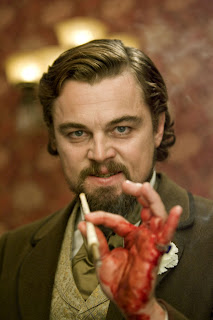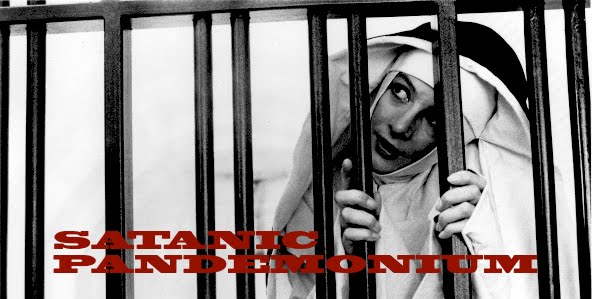
Quentin Tarantino, 2012
Starring: Jamie Foxx, Christoph Waltz, Leonardo DiCaprio, Kerry Washington, Samuel L. Jackson
Quentin Tarantino is one of those tricky subjects for cinephiles. There are plenty of die-hard film nerds who dislike him, and though I enjoy several of his movies, I can understand why. He essentially makes big budget B-movies/exploitation films. Though many of them are very entertaining, they aren’t particularly original. It annoys a lot of movie fans that he steals unmercilessly from other films they love, but I respect him to a certain extent because, without him, I doubt you would be able to go into a mainstream theater and see expensive, well-made exploitation flicks.
With that said, I don’t understand the hype around Django Unchained. Tarantino has claimed it's his best film and it’s received a lot of critical acclaim. Split in two, somewhat like Kill Bill, Django Unchained is first a neo-Western set in the antebellum South, where a slave named Django is freed by a German bounty hunter/ex-dentist, Dr. King Schultz. Django is desperate to find his wife, Broomhilda, who was sold to an unknown plantation after she and Django tried to run away together. Schultz trains Django to be a body hunter and they hunt down and kill two notorious slavers known as the Brittle Brothers. They form an unlikely partnership and collect more bounties and bodies.
The second segment of the film is historical melodrama/revenge film that involves King and Django tracking down Broomhilda, who is a slave at the infamous Mississippi Candyland plantation, owned by the very wealthy Calvin Candie. Though charming, Candie has a brutal side and is particularly fond of organizing fights where his strongest slaves battle to the death. King and Django pretend to be interested in the fighting ring in order to rescue Broomhilda and purchase her freedom. Can they hoodwink the clever and cruel Candie and free Broomhilda before the jig is up?
Django Unchained is inspired by a number of films, including its namesake, Django (1966), one of my favorite cult westerns. The titular Django drags a coffin around behind him for most of the film and tries to get revenge for his wife’s murder. Another major influence is the film Mandingo (1975), about slave fighting. There are references to numerous other westerns and exploitation films, including one of the greatest of the genre, Sergio Corbucci’s The Great Silence (1968).
The film benefits from some very strong performances, three in particular. As with Inglourious Basterds, Christoph Waltz absolutely steals the film. His performance here as Dr. King Schultz is somewhat similar to his performance in Basterds. He is a protagonist, but one who is willing to do some very unpleasant things. And, as always, he's incredibly charming. Leonardo DiCaprio is fantastic as the charismatic, but occasionally rabid Calvin Candie, and is easily one of Tarantino’s most memorable recent villains. Samuel L. Jackson also gives a great performance as Stephen, Candie’s villainous head house slave, another of the film’s best characters. It must be seen to be believed. Jamie Foxx gives a decent, if subdued performance as Django, but suffers from some of the script's limitations. Kerry Washington is lovely, but forgettable as Broomhilda. Unlike nearly every single one of Tarantino's other films, this lacks any strong, memorable female characters.
As with most Tarantino films, there are some great cameos. James Remar, Michael Parks, Tarantino himself, Russ Tamblyn, Tom Savini, and Dennis Christopher (Fade to Black) make appearances, along with many others. One of the best bit parts in the film goes to Don Johnson. It’s better if I don’t spoil it, though it may take you a moment to recognize him. The absolute best cameo is the original Django, Franco Nero, who has a humorous discussion with Django about how his name is pronounced. He might be in his early 70s now, but he’s just as handsome as ever.
Django has received a lot of positive critical attention, as well as five Academy Award nominations (with wins for Best Supporting Actor for Waltz and Best Original Screenplay for Tarantino) and it is Tarantino’s most successful film to date. And yet, I'm ambivalent about it. The thing I disliked the most about Django Unchained is its lack of a compelling central character. As with Kill Bill, the film is essentially about a person being freed (Django has his freedom purchased by King and Beatrix wakes up from a coma) to begin a lengthy course of revenge and retrieve a beloved person that was lost (Beatrix’s daughter and Django’s wife). But unlike Kill Bill’s Beatrix, Django is not the most interesting character in Django Unchained and thus the movie basically falls apart three-fourths of the way through when King and Calvin Candie die. The very lengthy 165-minute running time is simply too much for this film. Where Inglourious Basterds is able to keep the pace going because of the large number of well-written characters, Django falls short.
Like Inglourious Basterds, Django Unchained is a historical revenge fantasy, though it is smaller in scope and deals with one slave’s revenge against a few individuals, with the ultimate goal of rescuing his wife. For many reviewers and audience members, the question of racism in Django was a difficult subject. Though Tarantino is able to express the spirit of the times by depicting various types of racism and racially motivated violence and murder, people took issue of his use of the word “nigger.” Personally, I find this baffling. What word do you think people used in the antebellum south? Drive through Baltimore or South Philadelphia, or a variety of other places around the country. What word do you think uneducated, conservative white assholes are still using, if more discretely? Nigger. That’s what word they are using. And pretending it doesn’t exist only makes it more offensive. Tarantino actually drives this home with some excellent satire, namely during a hilarious scene where a pre-KKK group don cheap white hoods and attempt to hunt down King and Django.
Tarantino excels at historical themes because he is able to capture the spirit of a time more than factual occurrences. The sickening treatment of slaves during this period in American history is expressing with whippings, branding, beatings, etc. The Mandingo-style slave fighting is probably the most powerful example, even if it is not entirely factual. There’s not a whole lot of evidence that slave fighting rings were popular, but it is a wonderful symbolic example of the horrible violence perpetrated against slaves during this period. It elegantly and violently shows the subjugation of bodies for profit, which is at the root of slavery.
Tarantino further complicates the slavery/racism theme with the presence of Dr. King Schultz and the inclusion of Germanic ideology. Schultz, who is fighting against slavery, hints at what is to come in German history. The Nibelungenlied references are troubling, though Broomhilda von Shaft’s name fortunately pokes fun at this. Though Django Unchained is, at its core, about a black ex-slave getting revenge on white slavers, as other reviewers have already written, the film is ultimately a fantasy for white people about alleviating white guilt over American slavery. The most interesting characters with the most evolved, compelling rhetoric are white. Django barely speaks and barely emotes, other than moments of calculated anger.
Ultimately this is one of Tarantino’s weaker films, primarily because it lacks the strong writing and witty dialogue that has become one of his signatures. It is still one of the most interesting films to get a wide, commercial release in 2012 and comes recommended. The level of violence has received a lot of criticism, but I don’t think it will phase most genre fans. The final shootout, where Django completes his revenge, is so over-the-top it feels cartoonish, with Candie’s sister taking a gun shot to the chest and actually flying backwards off camera. There's the usual great soundtrack, with a mix of classic rock/pop songs, Ennio Morricone music, the theme from the original Django, and classical music.
Django Unchained is available for pre-order on Blu-ray. Be forewarned about the length and somewhat slow pace during the last two-thirds of the film, but decide for yourself how gratuitous the racism and violence is. It is, at the least, worth watching for Samuel L. Jackson, Christoph Waltz, and Leonardo DiCaprio.

No comments:
Post a Comment